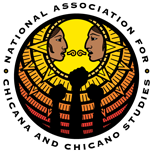|
NACCS |
The Antonia I. Castañeda Prize
The Antonia I. Castañeda Prize is awarded to a published scholarly article or book chapter of an historical orientation on the intersection of class, race, gender, and sexuality as related to Chicana/Latina and/or Native/Indigenous women. The piece must have been published in the previous year by a woman who is an ABD graduate student, pre-tenured faculty member, or an independent scholar.
Purpose of the award: The award is designed to promote and acknowledge scholarship of an historical orientation by Chicana/Latina and/or Native/Indigenous scholars working on issues of intersectionality. No books or creative writing considered. Publication should have been published during the November 2024 to November 2025 period.
Application/Nominations Process: Both applications and nominations are encouraged. Submit a PDF copy of the published manuscript, paper, or article and a two-page curriculum vita of the applicant or nominee. The submission must include a short letter by the applicant or nominee addressing the merits of the article or book chapter’s contribution to the field. Applicants are also required to solicit a letter from a third party to that effect (e.g., from an adviser, a chair, a colleague). In all cases, applicant or nominee contact information, email address, telephone number, and mailing address, must be included in the application/nomination letter. Submissions of all materials shall be delivered electronically by the deadline directly to: naccs@naccs.org
Deadlines:
November 30: Application due to NACCS at naccs@naccs.org
January 15: Awardee is notified by the Selection Committee
Terms of the award: $500 monetary award. Plus, up to $750 if travel/lodging is needed by awardee.
Awards Committee. The awards committee is composed of three (3) NACCS members who work in the areas addressed by the prize. (preference is for past recipients to be on committee)
Past Recipients:
- 2024: Alana de Hinojosa, "El Rio Grande as Pedagogy: The Unruly, Unresolved Terrains of the Chamizal Land Dispute," American Quarterly 73.4 (2021): 711-742.
- 2024: Yvette Saavedra, "Speaking for themselves: Rancheras and Respectability in Mexican California, 11800-1850." California History 10.1, February (Spring) 2023, 3-26.
- 2021: Leo Valdes, “In the Shadow of the Health-Care City: Historicizing Trans Latinx Immigrant Experiences during the Coronavirus Pandemic.” US Latina & Latino Oral History Journal, vol. 5, 2021, pp. 32-65.
- 2019: Clarissa Rojas Durazo, "For Breath to Return to Love: B/ordering Violence and the War on Drugs." In The Routledge History of Latin American Culture, edited by Carlos Manuel Salomon.
- 2018: Maria Elena Duarte, "Uneven Exchanges: Borderlands Violence and the Search for Peace at Sand Creek." Chicana Latina Studies 16(1).
- 2017: Margo Tamez (Nde'), "Indigenous Women's Rivered Refusals in El Calaboz." Dialogo 19, 1 (Spring 2016): 7-21.
- 2015: Belinda Linn Rincón, "Estas son Mis Armas": Lorna Dee Cervantes Poetics of Feminist Solidarity in the Era of Neoliberal Militarism." WSQ: Women's Studies Quarterly 42(3&4): 51-69.
- 2014: Jenny Luna, "La Tradición Conchera: Historical Process of Danza and Catholicism." Diálogo 16(1): 47-64.
- 2013: Vanessa Fonseca, "Rosaura Sánchez, critica marxista y máxima expresión del La Jolla Circle: sus contribuciones a la critica chicana, la sociolingüistica y la recuperación de la obra decimonónica de María Amparo Ruiz de Burton." In Chican@s y mexican@s norten@s: Bi-Borderlands Dialogues on Literary and Cultural Production. Edited by Graciela Silva-Rodriguez and Manuel de Jesus Hernandez-G. 73-110.
- 2012: Cindy Cruz, "LGBTQ Street Youth Talk Back; A Meditation on Resistance and Witnessing." International Journal of Qualitative Studies in Education 24(5): 547-558.

